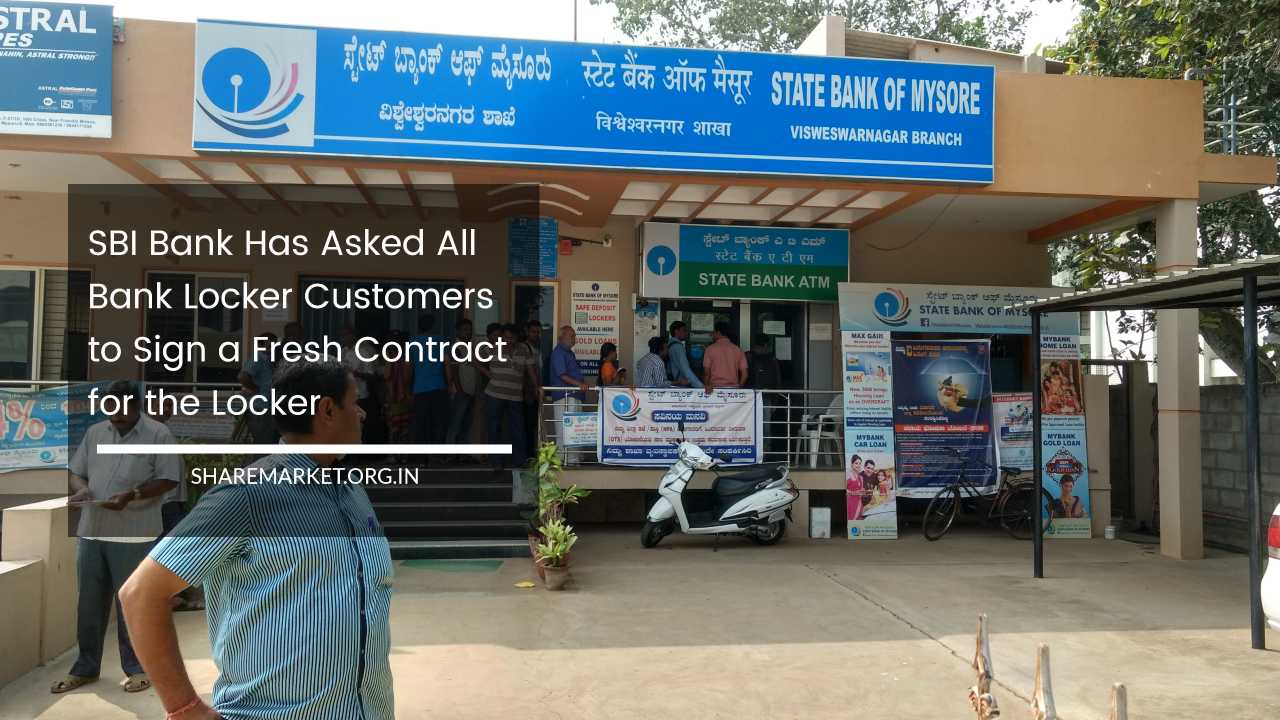SBI Bank Has Asked All Bank Locker Customers to Sign a Fresh Contract for the Locker

SBI Bank
SBI, the largest bank in India, has recently introduced new rules for customers who hold lockers with the bank. This development comes in response to a directive from the Reserve Bank of India (RBI), the country’s central bank.
In accordance with the RBI’s order, SBI has requested all of its bank locker customers to personally visit their respective bank branches.
The purpose of this visit is for SBI to facilitate the signing of a fresh contract pertaining to the bank lockers. It is mandatory for all customers to complete this contractual process to ensure compliance with the updated regulations.
By signing the fresh contract, customers reaffirm their agreement with the revised terms and conditions governing the usage and operation of their bank lockers.
The decision to enforce a new contract for bank locker customers aligns with SBI’s commitment to maintaining regulatory compliance and ensuring the security and transparency of its services.
By having customers personally visit the bank, SBI aims to facilitate a smooth transition and provide necessary assistance during the contract signing process.
To adhere to this new requirement, customers who hold lockers with SBI are encouraged to promptly schedule a visit to their nearest SBI branch.
It is essential to bring along the necessary identification documents and comply with any additional requirements set forth by the bank.
By implementing these measures, SBI seeks to enhance its operational efficiency, strengthen customer trust, and ensure the ongoing safety and integrity of its locker services.
Customers are advised to stay updated on any further communications from SBI regarding this matter and to promptly address the contractual requirements to avoid any disruptions in their locker access and usage.
Important Deadline for SBI Bank Locker Customers: Signing of New Contracts
SBI Bank has issued an official notification via its Twitter account, emphasizing the importance of locker customers signing new contracts at their respective branch locations.
In line with the Reserve Bank of India’s (RBI) directive, all banks, including SBI, are required to have a significant proportion of their locker holders sign new contracts within specified timelines.
According to the RBI’s instructions, banks are required to ensure that 50 percent of their locker holders sign the new contracts by June 30.
Subsequently, by September 30, the target increases to 75 percent of locker holders, and by December 31, all locker customers are expected to sign the updated contracts.
This phased approach allows for a gradual implementation while ensuring compliance across the board.
The objective of this directive is to enhance security, transparency, and operational efficiency in bank locker services.
By signing the new contracts, customers reconfirm their agreement with the revised terms and conditions, ensuring a standardized framework for operating bank lockers.
In addition to signing the contracts, the RBI has also mandated that banks update the status of their locker holders on an efficient portal.
This portal enables effective monitoring and tracking of the contract signing process and allows banks to report their progress in meeting the specified targets.
SBI Bank urges all its locker customers to take prompt action and visit their respective branches to sign the new contracts within the given deadlines.
Customers should ensure they carry the required identification documents and comply with any additional procedures specified by the bank.
By adhering to these regulatory requirements, SBI Bank aims to foster customer trust, maintain compliance, and provide a secure and efficient banking environment.
Customers are advised to stay informed through official communications from SBI and to promptly complete the necessary contractual formalities to avoid any disruptions in their access to and usage of bank lockers.
SBI Bank Locker Charges: Understanding the Fee Structure
SBI customers should be aware that the charges for bank lockers vary based on the size and location of the locker. It’s important to note the following details regarding the charges associated with SBI Bank lockers.
For small and medium-sized lockers, including GST, a fee of Rs 500 will be applicable. However, for larger lockers, customers will need to pay a registration charge of Rs 1,000, in addition to the applicable GST.
The rental charges for bank lockers are determined based on the city and the size of the locker. Let’s explore the specific charges based on different scenarios:
- Small Lockers:
- In urban or metro cities, customers will be charged Rs 2,000 plus GST.
- In small towns or rural areas, the charge for a small locker will be Rs 1,500 plus GST.
- Medium Lockers:
- In urban or metro cities, the cost for a medium-sized locker is Rs 4,000 plus GST.
- In small towns or rural areas, the fee for a medium-sized locker will be Rs 3,000, including GST.
- Large Lockers:
- Customers opting for larger lockers in major metro cities will have to pay Rs 8,000 plus GST.
- In small towns and rural areas, the fee for a larger size locker will be Rs 6,000, including GST.
It’s important for customers to consider the size and location factors when assessing the applicable charges for SBI Bank lockers.
The fees associated with lockers are subject to periodic revisions, and it’s advisable to check with the bank or refer to their official documentation for the most up-to-date information.
Bank lockers provide customers with a secure storage solution for their valuable possessions. Prior to renting a locker, customers should carefully evaluate their requirements and choose a size that adequately meets their needs.
For any specific queries or further information regarding the charges or availability of lockers, customers are advised to reach out to SBI Bank directly through their official channels of communication.
Note: The mentioned charges are based on the provided information and may be subject to change. It’s recommended to verify the details with SBI Bank for the latest fee structure and any applicable terms and conditions.

















